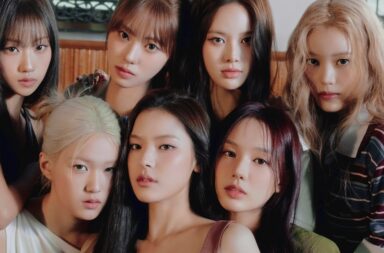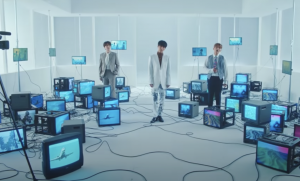
The first official sub-group of Super Junior, Super Junior K.R.Y., released When We Were Us, their first Korean mini-album since its formation 14 years ago. Given that this trio has released music in both Korea and Japan and has had several tours, this EP was highly anticipated, especially with the return of all three members from the military (Kyuhyun was discharged most recently in May 2019). Even though there is a distinct lack of musical variety among these tracks, with most of them being ballads, this album sticks true to the core identity of K.R.Y., and casts the spotlight on the fantastic vocals of each member, both individually and as a unit.
To begin with, “The Way Back To You” stands out immediately as the only non-ballad of the album. With its brass instrumentation, jazz piano, upbeat rhythm, and a tasteful harmonica, this song is both hopeful and playful. The subtle sound effects (such as whistle sounds) added at key transitory parts of the track do well to richen it, increasing the musical delightfulness of this song. Its depiction of the heart-fluttering excitement felt by someone making his way back to a lover is spot on, with the right amount of joy and sincerity injected into each note sung. This track, and many others in the album, simultaneously display the diversity and unity of the trio. While each member’s voice is distinct and plays different roles in each song, the transition between the parts never come across as jarring but are seamless blends.
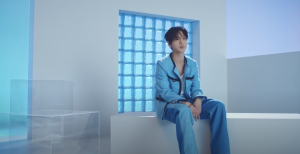
Instrumentation wise, the register of “The Way Back To You” reflects the high spirits of the song, and no track comes as close to that as “Midnight Story”, a ballad that speaks of love in metaphors of moonlight. Its use of the acoustic guitar to open the track, as opposed to the piano, gives the song a lightness that is rare in this album. With a lilting rhythm, the song pans out like a childhood fairytale, a simple melody sprinkled with unexpected twists and turns that keep the song interesting. The concluding whistling section of the track is magical, and it works with the other musical elements to create an idyllic atmosphere that the song comfortably settles itself in.
While the two aforementioned tracks rely heavily on the instrumentals to create the mood of the piece, K.R.Y. turn the focus back on their vocals in the remaining four songs. Title track “When We Were Us” does exactly that: while its MV is visually engaging and abstract, its instrumentation and flow are perfectly predictable. Run of the mill, ordinary, and yet moving, it is unabashedly conventional, but it is also a great addition to the K-ballad genre. “When We Were Us” encompasses the essence of K.R.Y. as a ballad group, which is probably why it was chosen as the title track, in spite of its ordinariness.
Our shining season that we couldn’t stop
The rain beautifully falling all over my heart
No matter how many times I go back in time
I will hug you over and over
Longing of the blue summer day we both laughed and cried
The protagonist reminisces over summers spent with his lover, and K.R.Y capture that longing with their emotional voices. The members make this song their own, characterizing each part in a way unique to them. For instance, they take turns singing the chorus throughout the song, and at each juncture, the chorus has a slightly different nuance depending on who sings it. Ryeowook‘s final chorus cuts to the heart because of his sweet and clear voice, while Yesung‘s first chorus is sorrowful, especially with his deeper and fuller voice. The members have different strengths and they absolutely embrace these differences, using them powerfully to tell a story. As the song builds, so do their voices, and the harmony portions towards the end of the track are absolutely divine.
Interestingly, for these six tracks of the album, each member begins two songs each. This speaks not just about part distribution, which is really equal relative to Super Junior’s usual line-splitting, but it allows each member to create different moods for each track. Kyuhyun starts off “Way To Busan” just as he did in the title track, and while the latter starts more wistfully, the lack of musical introduction in “Way To Busan” leaves his voice sounding more stark than it normally does. The loneliness of the protagonist in this song is felt immediately, and his voice just strikes at the listener’s heart. There is a twinge of nostalgia for the times of the past, but there is overwhelming hopelessness, knowing that even if he goes to Busan, nothing will change. Small details such as the use of the cello to accompany Kyuhyun’s voice, before transiting to higher string instrumentation to match Ryeowook’s voice, reflect how well the composers and producers of these songs understand the vocal qualities of K.R.Y., and this level of consistent meticulousness is evident in this album.
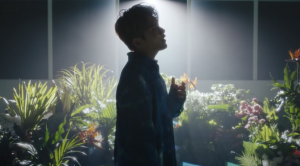
Along with their harmonies, K.R.Y. often echo each other, adding layers of emotion and melodies atop each other, and this is especially prominent in “Way To Busan”. Rather than leaving them all to the bridge of the song, the harmonies are present through the verses and the choruses, while still ensuring that the song still has climatic moments. It is a pity that this is not the album’s title track, because it is the best ballad of the album. It evokes painful emotions in a masterful way, but more importantly, it is the best representation of the synergy of this trio, and why their voices work so well together. Their voices are similar enough to harmonise together, but even when they sing in unison, they each bring something different to the table, creating a full sound in a way that only K.R.Y. can.
The tracks on this album are all worthy of being K-drama OSTs, but none more so than “I Can’t”. Raw emotions are on full display here, along with the impressive vocal chops of all three members. The richness of Kyuhyun’s voice, Ryeowook’s stunning adlibs, and the slightly gravelly way Yesung sings work together to create this rollercoaster of a ballad. The call and answer way the saxophone interacts with the vocals throughout the song is a nice touch, although their voices are more than sufficient to fill up the track.
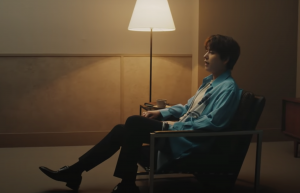
In contrast, things are toned down in “Home”, a quiet, final ballad that brings rest to the weary. Rather than being about heartbreak, as the past few songs have been, K.R.Y. sings of the desire to support and comfort those they love, who may have been worn out by the troubles of life. The gentle sincerity with which they sing, and the sadness they feel on behalf of those they love, makes this song a very relatable one for listeners. Even in the lyrics’ depiction of wanting to hug that loved one, wanting to give your shoulders to that person — these are the simple acts that show true love and display the most solidarity. There is no need for grandness when there is constant companionship and empathy. As is the pattern of this group, there are lovely harmonies in this, but they successfully create pathos even in the song’s less dramatic moments. It is one of the most moving tracks of the album, which is a feat considering that this is an EP full of sad ballads.
Rarely have there been albums that are this homogenous in terms of genre or instrumentation, but K.R.Y. are extremely comfortable in their established musical identity. They know that they are fantastic ballad singers, and they make the most of it. With all-round beautiful melodies, poetic lyrics, evocative instrumentation, and the stunning vocals and harmonies of K.R.Y., When We Were Us is bound to satisfy ballad fans, and it is well worth the 14-year wait. As Ryeowook had once mentioned in an interview, K.R.Y. creates songs that they themselves love and want to listen to. It is wonderful to watch them continue to live their dreams, and here’s hoping that it will not take another 14 years to get more music from this perfect trio.
(Images via SM Entertainment. Youtube.)

